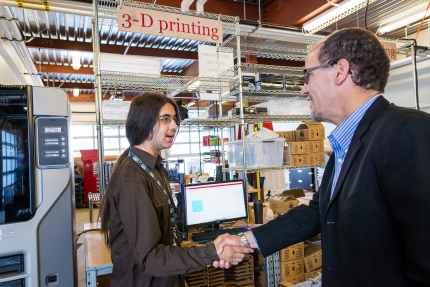When Tribes Compete, Tribes Can Succeed
Ed. note: This was originally posted on the U.S. Department of Labor's blog yesterday. See the original post here.
When President Obama made his first trip to Indian Country earlier this year, he told a compelling story about the impact federal investment and partnerships have in tribal communities. So I was privileged today to participate in the President’s sixth White House Tribal Nations Conference. Because of the challenges tribal communities continue to face with high rates of unemployment and barriers to opportunity, the conference was an important chance to discuss the Department of Labor and Administration’s efforts to create shared prosperity in Indian Country – and to hear from tribal leaders directly about their ideas for expanding and improving our work.
I’m proud of the work we’ve done at the Department of Labor for tribal communities. This summer, I had the chance to visit the Cook Inlet Tribal Council in Anchorage, Alaska. They’re using grant funding awarded through the Department’s Workforce Investment Act – Indian and Native American Program to develop a “Fab Lab,” where students are using the latest advanced manufacturing tools – including a 3-D printer – to gain the skills and training they need to excel in today’s workforce. The department has provided similar funding this year to 180 other tribal nations and Native American organizations, to support innovative job training and youth programs.
I’ve also been touring the country visiting winners of our Trade Adjustment Assistance Community College and Career Training (TAACCCT) competitive grant program. These grants support partnerships between community colleges and employers to ensure that job seekers are getting the skills they need for in-demand jobs in industries like technology, health care, energy, and advanced manufacturing. And we’ve awarded more than $38 million in TAACCCT funding to tribal colleges, including $5.1 million in the latest round of funding Vice President Biden announced in September. I look forward to visiting one of the winners next year.
These investments are making a real difference in the lives of Indians and Native Americans. That’s why I was proud to announce today at the White House Tribal Nations Conference that going forward, the Department will ensure that federally recognized tribes can apply for all of our employment and training grants. During the next two months, we’ll be clarifying and changing grant eligibility rules, and developing model grant language to include in our Funding Opportunity Announcements. And to make this effort successful, we want to hear from you.
This month, we will be holding the first of two consultations sessions with tribal leaders to develop a better understanding of the challenges tribal nations face when competing for DOL grants. We’ll also be asking for input on how best to encourage tribal grant eligibility at the department. The consultation will be held via conference call on December 18, 2014, with a second call taking place on January 14, 2015.
To register for the consultation sessions please click below:
December 18, 2014: 4pm – 5pm EST
http://webapps.dol.gov/DOLEvents/Event/View/339
January 14, 2015: 4pm – 5pm EST
http://webapps.dol.gov/DOLEvents/Event/View/340
When tribes compete, they can win. The department will do our part to make sure that tribes can compete. And I look forward to continuing to partner with tribal leaders to ensure that workers in Indian Country have the skills and training they need to succeed in good jobs.
Follow Secretary Perez on Twitter at @LaborSec.
White House Blogs
- The White House Blog
- Middle Class Task Force
- Council of Economic Advisers
- Council on Environmental Quality
- Council on Women and Girls
- Office of Intergovernmental Affairs
- Office of Management and Budget
- Office of Public Engagement
- Office of Science & Tech Policy
- Office of Urban Affairs
- Open Government
- Faith and Neighborhood Partnerships
- Social Innovation and Civic Participation
- US Trade Representative
- Office National Drug Control Policy
categories
- AIDS Policy
- Alaska
- Blueprint for an America Built to Last
- Budget
- Civil Rights
- Defense
- Disabilities
- Economy
- Education
- Energy and Environment
- Equal Pay
- Ethics
- Faith Based
- Fiscal Responsibility
- Foreign Policy
- Grab Bag
- Health Care
- Homeland Security
- Immigration
- Innovation Fellows
- Inside the White House
- Middle Class Security
- Open Government
- Poverty
- Rural
- Seniors and Social Security
- Service
- Social Innovation
- State of the Union
- Taxes
- Technology
- Urban Policy
- Veterans
- Violence Prevention
- White House Internships
- Women
- Working Families
- Additional Issues


